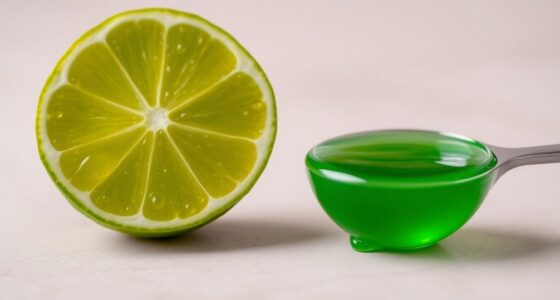Fresh lime juice is best used within 24 hours after squeezing to enjoy its optimal flavor and quality. The flavor peaks around six hours post-juicing, but it starts to deteriorate after that. If you need longer-lasting options, consider cold-pressed lime juice, which can last up to five days without preservatives. Just remember to store it in an airtight container in the fridge. There's more to know about keeping your lime juice fresh and tasty!
Key Takeaways
- Freshly squeezed lime juice is best used within 24 hours for optimal flavor and quality.
- The flavor of fresh lime juice peaks around six hours after juicing.
- Cold-pressed lime juice can last up to five days, providing a longer shelf life.
- Store lime juice in an airtight container in the refrigerator to maintain quality.
- Always check for signs of spoilage, such as off odors or changes in color before use.

When you squeeze fresh lime juice, you might wonder how long it'll stay good. Freshly squeezed lime juice has a relatively short shelf life, primarily lasting around 24 hours before it starts to lose its vibrant flavor and color. The flavor peaks approximately six hours after you juice the limes. After that, you'll notice that the taste begins to deteriorate, becoming less fresh and more bitter over the next 18 hours. If you want to enjoy that zesty, refreshing taste, it's best to use the juice as soon as possible.
To keep your freshly squeezed lime juice at its best, proper storage is key. If you store it in an airtight container and place it in the refrigerator, you'll maximize its usability, maintaining its quality for up to 24 hours. However, if the juice is exposed to air or light, the quality can diminish rapidly. This is because oxygen can react with the juice, leading to off flavors and unpleasant aromas that signal spoilage.
You might be interested to know that cold-pressed lime juice offers a significantly longer shelf life. This method of juicing allows the juice to stay fresh for up to five days without the need for preservatives or chemicals. If you're looking to keep lime juice on hand for longer periods, consider opting for cold-pressed options. They can be a great addition to your kitchen, especially if you frequently use lime juice in recipes or cocktails.
Despite its longer shelf life, even cold-pressed lime juice can spoil. Keep an eye out for signs of spoilage, which include strange odors, changes in color, and a bitter or off-putting taste. If you notice any of these signs, it's best to discard the juice for safety. Trust your senses; if something doesn't smell or taste right, it's better to err on the side of caution.
Frequently Asked Questions
Can Fresh Lime Juice Go Bad?
Yes, fresh lime juice can go bad.
You'll notice signs like a strange odor, color changes, or a bitter taste. To keep it fresh, store it in an airtight container in the refrigerator, but even then, it usually only lasts about 24 hours.
If you see any mold or smell something unpleasant, it's best to toss it out. Always trust your senses when evaluating the quality of lime juice.
How Do You Store Fresh Squeezed Lime Juice?
Picture a vibrant green gem, full of zest and flavor.
To store your fresh squeezed lime juice, transfer it immediately into an airtight container, sealing in that freshness. Keep it in the refrigerator, aiming to use it within 24 hours for the best taste.
If you can't use it right away, freeze it in ice cube trays—this way, you'll always have a splash of lime ready for your culinary creations!
How Long Is Fresh Squeezed Citrus Juice Good For?
Freshly squeezed citrus juice, like lemon or lime, generally stays good for 1 to 4 days in the fridge, depending on the type. To maximize its freshness, it’s essential to keep the juice in an airtight container and store it in the coldest part of your refrigerator. Additionally, if you’re looking for a longer shelf life, consider freezing the juice in small portions. Likewise, for those curious about how to store carrot juice, using similar methods will help maintain its vibrant flavor and nutritional value for several days.
To keep it fresh, store it in an airtight container immediately after juicing.
You'll notice signs of spoilage such as off odors, color changes, or bitterness, so trust your senses.
If you can't use it quickly, freeze it in ice cube trays for up to three months.
How Long Does Fresh Squeezed Lime Juice Last on Reddit?
Fresh squeezed lime juice doesn't last long, like a shooting star fading into the night!
If you're checking Reddit for advice, you'll find that it's best to use it within 24 hours to avoid off flavors. Bartenders recommend using it within 18 hours for that perfect cocktail.
If you want a longer-lasting option, try cold-pressed lime juice, which can stay fresh for up to five days.
Enjoy that zesty goodness while it's at its best!
Conclusion
In conclusion, fresh lime juice is a vibrant splash of flavor that can brighten any dish, but it doesn't last forever. When stored in the fridge, it'll keep for about one week, while freezing can extend its life to several months. Just like a sunset that fades into night, your lime juice will lose its zest over time. So, enjoy it while it's fresh and make every drop count in your culinary adventures!
Cindy thoroughly researches juicing trends, techniques, and recipes to provide readers with practical advice and inspiration. Her writing style is accessible, engaging, and designed to make complex concepts easy to understand. Cindy’s dedication to promoting the advantages of juicing shines through her work, empowering readers to make positive changes in their lives through the simple act of juicing.











